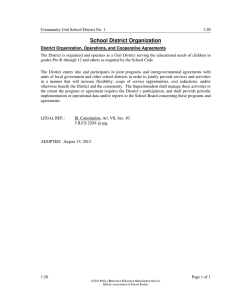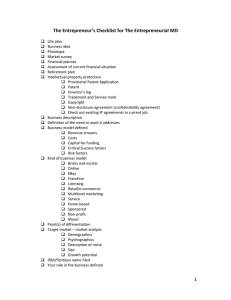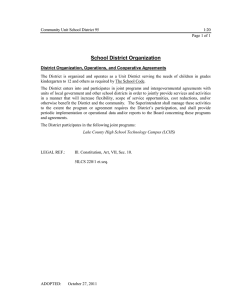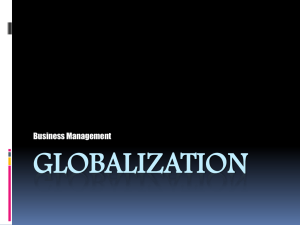Software and Law – Jed Scully Presented by: Diala T. Gammoh
advertisement
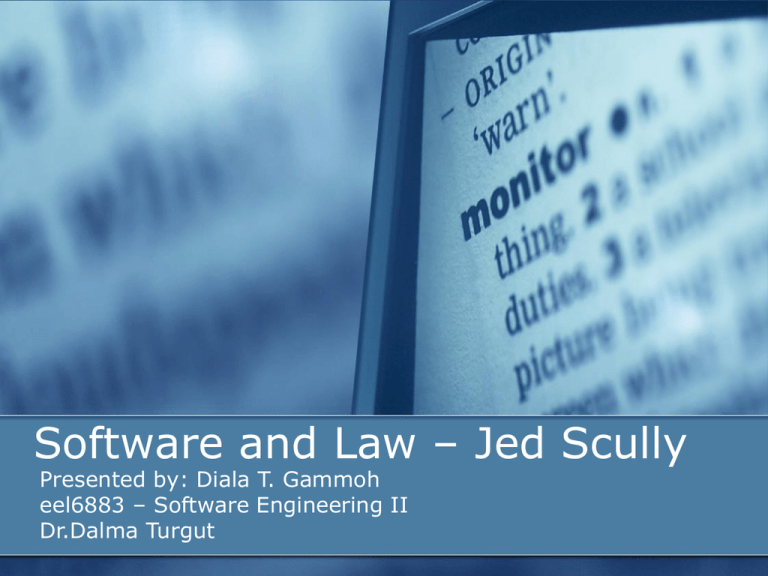
Software and Law – Jed Scully Presented by: Diala T. Gammoh eel6883 – Software Engineering II Dr.Dalma Turgut Agenda Introduction to Software and Law The Ownership of Intellectual Expression Software Copyright “Business Methods” Patents for Software Additional Statutory Remedies for Software Protection 2 Agenda The law of Contracts, Protocols and Private Agreements Future Developments for Software and the Law, 2005 – 2010 Summary and Conclusion 3 Introduction to Software and Law A Definition of Software: A software is a packaged set of electronic instructions for performing certain tasks on a computer hardware platform. Culture and Legal Assumptions: The idea of ownership is a cornerstone not only for the American Society but all modern, democratic nations and culture. 4 Introduction to Software and Law The Concept of Intellectual Property The ability to separate physical containers from valuable intellectual content is at the root of the legal rules that describe and protect intellectual property. 5 Introduction to Software and Law The Concept of Intellectual Property 6 Introduction to Software and Law The Role and Rule of Law “rules under law” are enforced by the state or the nation and any violations of these rules might result in a serious penalties. Jurisdiction and the Law Controlling cyberspace transactions is very problematic. Jurisdiction might control the hardware that generate and receive electronic data but digital transmission can easily bypass these controls. 7 Introduction to Software and Law Cyberspace, the internet and Intellectual Properties Before Cyberspace: John Perry Barlow-a lyricist for Grateful Dead and one of founders of the Electronic Frontier Foundation- refers to copyright as the protection of the bottles, or containers of fine wine rather than the protection of the wine itself. 8 Introduction to Software and Law After cyberspace: Any person can and does distribute content, regardless any ownership claims, throughout the “click and send” effort and without necessity of permissions or agreements. 9 The ownership of Intellectual Expression The ownership of Intellectual Expression: Copy Right: is the legal protection of expressive communication. Patent Right: is the invention which transforms “discovery” to new and useful use. 10 Software Copyright The components of copyright: - Human communicative content - Technology of transmitting an authorial product to others - Legally recognized economic and moral rights of authors - Methods for enforcing these rights The term “software” suggests intellectual expression rather than the particular format in which that expression is embodied 11 Software Copyright Traditionally, copyright defines legal rules, expectations and remedies for software. These classifications have lost much of their definitional relevance with the emergence of software systems as a means of manipulating and transmitting data through the internet. Video Conference: Restoring the balance to copyright Laws taken from www.youtube.com http://www.youtube.com/watch?v=8BsfgTd2hYk 12 “Business Methods” Patents and Software A Brief History of Patent and Business Methods Patents Several points about patent should be noted: - A patent will not be issued for something that is not new, novel or useful. - A patent must be an improvement on the technology or processes or on the natural world and natural order of things that already exists. - It is “invention” not “discovery” . 13 “Business Methods” Patents and Software Scope of Protection for Software Patents: A main issue faced by software developers and programmers is to what extent may one reference the ideas, abstractions and concepts of a patent-protected software system without infringement or violation. Patent protection does not allow anyone to use any part of protected invention without permission or license. 14 “Business Methods” Patents and Software Scope of Protection for Software Patents: It might be that copyright provides greater levels of protection for “expression” even though users may take advantage of the “fair use” of aspects of a copyrighted without permission 15 “Business Methods” Patents and Software Reverse Engineering and Encryption They found that some of the patents and copyrights need to be used by others for analyzing and discussions such as Reverse Engineering. Courts have determined that the lawful use of computers doesn’t constitute unlawful decryption of protected software. 16 “Business Methods” Patents and Software Reverse Engineering and Encryption However, there is continued legal uncertainty as to the extent to which new users can disassemble and reengineer protected software. Many observers feel that these restrictions slow down innovation and the development of new technological uses for encrypted digital content. 17 Additional Statutory Remedies for Software Protection Trade Secrets: It is any formulation, system, device, pattern or compilation of information used in business that gives the holder of the trade secret a potential competitive advantage in business. Unauthorized disclosure might destroy the trade secret’s value, but the person responsible for the disclosure could be held legally responsible. 18 Additional Statutory Remedies for Software Protection Trade Mark: Is a means of identifying and marking the origin of goods, including application programs. It is covered by both federal and state law. A registration system for trademarks establishes the rights and priorities of holders of a mark. 19 Additional Statutory Remedies for Software Protection Unfair Competition: Trademark infringement is a form of unfair competition, which also includes passing off your goods or services as originating with another producer. Moral Rights Protections We usually refers to morality to standards that are held by individuals, beliefs held by religion or by particular culture or community but which is not enforced by laws. 20 Additional Statutory Remedies for Software Protection Moral Rights Protections: These moral rights cannot be sold or traded away because they are inherent in the act of authorship. Tort Protection: As a legal term refers to the violation of a personal right for which a wrongdoer, might be held responsible in a civil court for money damages. 21 The Law of Contracts, Protocols, and Private Agreements Legal Contract is a promise or set of promises that the law will enforce, usually by imposing money damages for failure to perform according to one’s promises. Contracts can be between persons who have no particular relationship with one another. 22 The Law of Contracts, Protocols, and Private Agreements In addition to contracts, there are protocols and methods of doing business that may not be enforceable by of law and legal system but regulate the conduct of persons engaged in the same activity. Handshake and verbal agreements are used sometimes. 23 The Law of Contracts, Protocols, and Private Agreements The Modern “Law Merchant” Law Merchant as a system of rules and regulations recognized by traders as the law for the regulation of their commercial standards. It has received renewed emphasis with the borderless character of digital transactions and the transfers of information and commercially valuable software. 24 The Law of Contracts, Protocols, and Private Agreements The Modern “Law Merchant” International commerce players also established governmental courts and tribunals that interpret and enforce these agreements including the International Chamber of Commerce in Paris, the London Court of International Arbitration, and the American Arbitration Association. 25 The Law of Contracts, Protocols, and Private Agreements The Modern “Law Merchant” The Example of Microsoft Monopoly of the Browser. Microsoft was trying to reach to a certain business model that navigates among the requirements of several national bodies like the United States Department of Justice’s Antitrust Division and the European Union. 26 The Law of Contracts, Protocols, and Private Agreements The Modern “Law Merchant” It was only 15 years ago that the United States agreed to join the Berne Convention which provides the mechanism for enforcing international copyright. Through GATT, NAFTA and the World Trade Organization, the United States has now taken a leading role in developing international enforcement mechanisms for intellectual property. 27 The Law of Contracts, Protocols, and Private Agreements ADR, ODR and Statutory Enforcement of Private Agreements: Nation states and the international law community established international agencies such as the World Intellectual Property Organization (WIPO), charged with the enforcement of various international treaties such as: - ADR (Appropriate Dispute Resolution) - ODR (Online Dispute Resolution) 28 The Law of Contracts, Protocols, and Private Agreements ADR, ODR and Statutory Enforcement of Private Agreements: ADR and ODR provides a broad set of remedies for the resolution of software ownership, use, dissemination issues. “Appropriate” refers to the fact that the parties to an agreements should have latitude to decide on the mechanisms for resolving issues that arise regarding the enforcement of their agreements. 29 The Law of Contracts, Protocols, and Private Agreements ADR, ODR and Statutory Enforcement of Private Agreements: ODR simply refers to the fact that all or portions of these mechanisms can take place over the internet by synchronous or asynchronous video conference. The use of ADR and ODR as a substitute for formal court trials is rising rapidly in popularity in the United States. 30 The Law of Contracts, Protocols, and Private Agreements Domain Names and Cyber squatting: There is a significant confusion over the relationship between a URL domain name on the Internet and a trademark for a good or service. ICANN is a private nonprofit agency received the right to serve as the registrar for domain names. 31 The Law of Contracts, Protocols, and Private Agreements Domain Names and Cyber squatting: Difficulties arose because many entities that had a reputational interest in a desired trademark wished to carry that trade in terms of a domain in the URL identifier on the internet. US law has moved to protect the invested reputations of those who had valuable trademarks because similarities are likely to cause consumer or competitor confusion. 32 The Law of Contracts, Protocols, and Private Agreements Domain Names and Cyber squatting: Congress also enacted an Anti cyber squatting (registering an internet name for the purpose of resetting it for a profit) Consumer Protection Act . 33 Future Developments for Software and the Law 2005-2010 Globalization and Jurisdiction: - It is hard to make predictions for more than 3-5 years into the future. - Globalization will expand and national jurisdictions will lessen in centrality and importance as the traffic in digital distribution of software increases. 34 Future Developments for Software and the Law 2005-2010 Globalization and Jurisdiction: - Treaties are of limited utility in controlling electronic data flow. - Global protocols and market-based competitive solutions seem to offer better options for realizing the full potential of authorial software contents. 35 Future Developments for Software and the Law 2005-2010 Continued Growth in Global Market-based Solutions: We expect greater growth and vitality in private, market-driven, global protocols, agreements and dispute resolution mechanisms as global market software players recreate a 21st century equivalent of the “law merchant”. 36 Future Developments for Software and the Law 2005-2010 The Power of Contract: Contract does not depend only on the state power but on the autonomy of private individuals and groups who are committed to the values inherent in honoring private agreement. 37 Future Developments for Software and the Law 2005-2010 Protecting and Innovation – Competing or Complementary Concepts? The best we can say is that innovation may be temporary retarded by intellectual property protections but significant technological advance will be driven by competitive global markets, not by restrictions in nationally based intellectual property statutes. 38 Future Developments for Software and the Law 2005-2010 Protecting and Innovation – Competing or Complementary Concepts? An example is provided by the strength in the development of open-source software for computer operating systems, like Linux. Global market players realize that computer operating systems like alphabet and the internet itself belong to the public domain, free for anyone to use. 39 Summary and Conclusions People interested in software, whether as developers, designers or programmers should have in mind a drop-down menu for legal protections systems that should include the following elements: 1- Copyright 2- Patent 3- Trademark 4- Contract 5- Jurisdiction 40 Summary and Conclusions 6- International law and compacts 7- Globalization 8- Other potential remedies, including moral rights protections. 41 My Thoughts about the paper It was a long paper . It mentioned lots of concepts related to the software and law. I think it will be better if the mentioned more examples about stealing software and how the law will prove it. 42 References http://www.cartoonsscott.com http://www.youtube.com 43 THANK YOU 44
